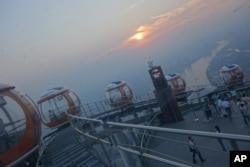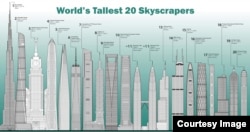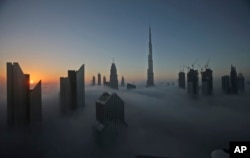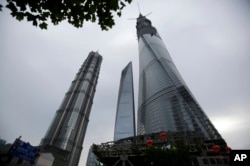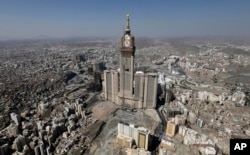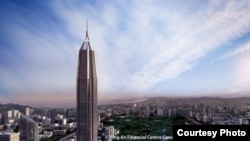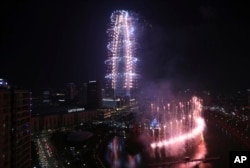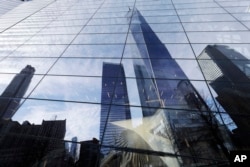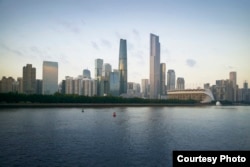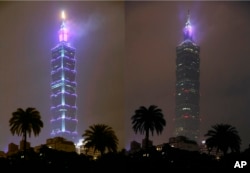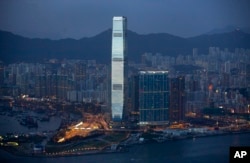Skyscrapers look like their name: They are buildings so high; it appears like they are scraping, or touching the sky.
With better technology, architects — people who design buildings — engineers and builders have been able to build buildings higher and higher.
For the cities and countries where they are built, they bring a sense of pride and visitors. They bring their money and the desire to be entertained.
Daniel Safarik works for the Council on Tall Buildings and Urban Habitat (CTBUH), a group with members all over the world. He says the race to build tall buildings started in the United States in the 19th and 20th centuries between companies showing their economic power.
Now, he says, the competition is between cities, and countries.
“Part of the competition, of course has to do with pure height and the bragging rights to say that you hold that title. That is certainly the case with say, the top ten and twenty.”
But just being a very tall building is no longer enough to get people to visit. Safarik says those that invest heavily in entertainment will be most successful financially.
“Some of the things that they have done is put amusement park style rides at the top. That includes Ferris wheels, roller coasters, sheer drop type rides — where you’re basically just in a moment of free fall before whatever safety equipment they have engages.”
Older buildings have added items like glass floors or tilting rooms that give you the feeling of looking out high over the edge.
Even within the same city, some of these tall buildings compete for people’s attention—and money.
Take Shanghai, China for example. The Shanghai Tower is the world’s second tallest building. Its unusual shape—rounded and twisted, with a second outer layer is a sight to see. Nearby is the Shanghai World Financial Center, number nine on the list. There you can walk on a sky bridge with a glass floor to look down to the roofs and neighborhoods below.
Safarik says a third building in the city, the 19th tallest one in the world, also opened a new attraction.
“The Jin Mao tower the oldest of the three has just recently opened up an experience where basically you can be tied to the side of the building and lean over the edge outdoor and sort of (laugh) test your fortitude.”
Because of what it takes to get these buildings to rise up out of the ground, and stay there, Safarik says they are some of the safest buildings around.
Grouping many people in one place makes sense as the planet’s population grows. These tall buildings can be environmentally sustainable, especially when they are located near mass transportation like trains and subways.
How high will the next ones be? For now, one limit appears to be elevators-- how fast and far they can go, and what peoples’ comfort level is.
Here is a list of the top ten tallest buildings in the world.
1. Burj Khalifa
Standing 828 meters high, this building in Dubai, United Arab Emirates has 163 floors. The center of a new downtown, it was completed in 2010. It calls itself a “vertical city.” Level 148 holds the world’s highest observation deck. A new spiral flight enclosed in glass connects Levels 124 and 125 and opens to views of the city.
2. Shanghai Tower
Shanghai Tower, completed in 2015, has 128 floors and is the tallest of three in the city’s finance area. The curved building is 632 meters tall and its twisted shape provides protection from wind. It has a see-through glass second skin that wraps around the building. It has one of the world's fastest elevators that moves up at 20.5 meters per second.
3. Makkah Royal Clock Tower
Standing at 601 meters high, this tower is in the center of the holiest Islamic city, Mecca, Saudi Arabia. Completed in 2012, it 120 floors and housing for Muslims making the journey there every year for the Hajj. Four very large clocks — the largest and highest in the world -- are located near the top of the tower.
4. Ping An Finance Center
Located in Shenzhen, China, it stands 599 meters high and was completed in 2017. It is connected to neighboring business and residential properties. The tower’s shape narrows to form a pyramid at the top. It has 115 floors and the world’s largest stainless steel façade, or face.
5. Lotte World Tower
Newly opened in Seoul, South Korea. The 123-story glass and steel structure is South Korea’s tallest building. It rises 554.5 meters above the Seoul skyline. The tower features the world’s highest floor made of glass. The building also has the highest swimming pool in the world, and one of the world’s fastest elevators.
6. One World Trade Center
This New York City building replaces the World Trade Center towers that were destroyed on September 11, 2001. It rises 541.3 meters above the memorials in the ground where the twin towers once stood. With 94 floors, the building helped bring back downtown Manhattan as a business center. It is the tallest building in the Western Hemisphere.
7. Guangzhou CTF Finance Centre
Located in Guangzhou, China, this building is 530 meters high with 111 floors. Completed in 2016, it has four setbacks as it climbs in the air. This design allows for sky terraces and dramatic skylights. The use of terracotta as a building material helped environmentally.
8. Taipei 101
Located in Taipei, Taiwan, this building was the first 100 plus story building built in the 21st century. It once was the world’s tallest building because it had a 60-meter spire that made it 508 meters. The tower’s top section has observation levels and a private club, on floor 101.
9. Shanghai World Financial Center
Completed in 2008, this is the second tallest skyscraper in China. It is 492 meters tall, and has 101 floors. Located in the financial center, it has luxury hotels and meeting areas. Builders say it can survive a massive 8-magnitude earthquake. Its Sky Walk is on floor 100 and creates the sense of walking in the air above the nearby buildings and city.
10. International Commerce Centre
Located in Hong Kong, this building is 484 meters high with 108 floors. Completed in 2010, it houses financial institutions, a 360-degree observation deck and the world’s highest hotel, The Ritz-Carlton Hong Kong.
I’m Anne Ball.
And I’m Jonathan Evans.
Anne Ball wrote this story for Learning English. Hai Do was the editor. We want to hear from you. Write to us in the Comments Section.
____________________________________________________________
Words in This Story
bragging rights – n. a good reason to talk with pride about something you have done
amusement park – n. a place that has games and rides for entertainment
twisted – adj. not a normal shape
fortitude – n. mental strength and courage that allows someone to face danger, pain, etc.
sustainable – adj. involving methods that do not completely use up or destroy natural resources
elevator – n. a machine used for carrying people and things to different levels in a building
spiral – n. a circular curving line that goes around a central point while getting closer to or farther away from it
pyramid – n. a shape, object, or pile that is wide near the bottom and narrows gradually as it reaches the top
setback – n. in architecture, a steplike recession in the side of a high-rise building
terracotta – n. a reddish clay that is used for pottery and tiles






